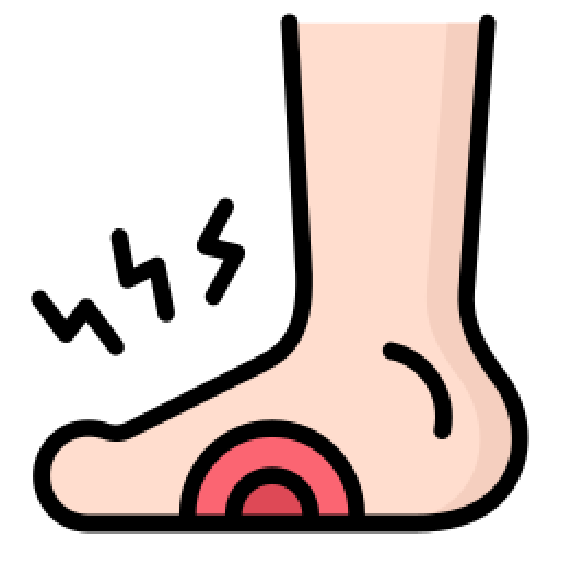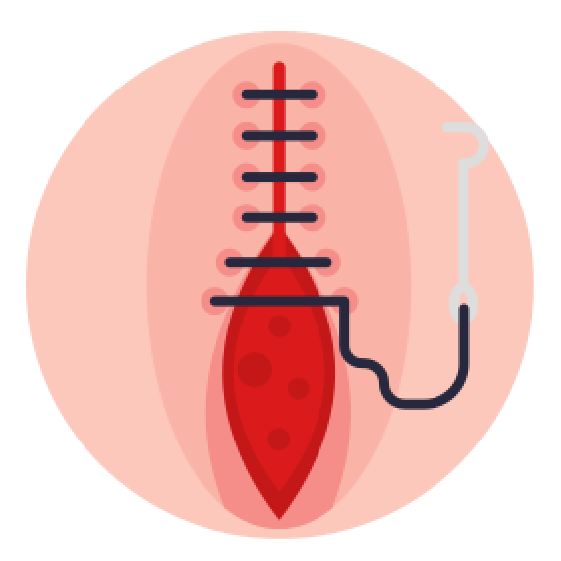Wound Care Clinic
Chronic Wounds
Chronic wounds represent significant healthcare challenges, impacting millions of individuals worldwide. These wounds are characterized by their inability to heal within anticipated schedules, frequently recurring and often accompanied by underlying health issues. Chronic wounds can be uncomfortable, prone to infection, and greatly affect a person’s quality of life; as a result, they need specialist medical care and therapies to speed up recovery. Treating chronic wounds can be painful, debilitating, and costly.
DETERMINING FACTORS
Factors that Play Role in the Formation of Chronic Wounds
Chronic wounds do not exist in isolation; instead, they reflect underlying health conditions. Various elements contribute to the development of enduring wounds, including:
Vascular Disease- Inadequate blood flow, attributed to conditions like venous insufficiency or arterial diseases, can result in the emergence of chronic wounds. Chronic wounds such as venous ulcers, diabetic foot ulcers, and pressure ulcers serve as illustrations of wounds stemming from vascular disorders.
Diabetes- According to American Family Physician, diabetes significantly elevates the risk of chronic wounds, particularly diabetic foot ulcers. Diabetic foot ulcers, a leading cause of lower limb amputation, demand early intervention due to their associated high mortality rates. These ulcers stem from a combination of neuropathy, peripheral arterial disease, and structural foot deformities, exacerbated by diabetes-induced sensory, motor, and autonomic nerve dysfunction. As a result, diabetic ulcers typically manifest on the toes or beneath the metatarsal heads, displaying characteristic crater-like features, eschar or necrotic tissue, and exposed deep structures like tendons and bones.
Pressure ulcer- Pressure ulcers, also known as bedsores, result from prolonged pressure, friction, and moisture on specific body areas, typically those with bony prominences like heels, ankles, coccyx, and hips. When a body part remains in contact with a surface, like a chair or bed, for an extended period, blood flow to that region decreases, leading to cell damage and skin breakdown. Risk factors for pressure ulcers encompass obesity, prolonged bed rest due to injury or illness, urinary or bowel incontinence, and conditions like diabetes. Additionally, individuals with inadequate nutrition are at a higher risk.
The Signs You Shouldn’t Ignore
Chronic wounds frequently exhibit the following signs and symptoms:

Persistence Pain

Recurrence

Altered Skin Colour

Granulation Tissue

Necrotic Tissue

Delayed Healing

Claim your free 20-minute doctor consultation online today!
Book Now ›

Treatment
Wound Care Principles
Chronic wounds can result in a variety of consequences that go beyond the surface because they are frequently resistant to prompt healing. These issues can offer serious health concerns and difficulties for people with chronic wounds as well as their medical professionals. Understanding these possible issues is essential for early detection, quick response, and efficient management.
Debridement: Debridement in chronic wound care involves removing dead or inflamed tissue using instruments like tweezers, a curette, or a scalpel. An enzyme-based gel or high-pressure water jets can assist in cleansing the wound. Medical maggots can also be used for tissue and fluid removal. Local anesthetics, like ointments, help manage discomfort, with painkillers for more severe cases. Larger wounds may require cleaning under general anesthesia. However, research on the effectiveness and drawbacks of these techniques is limited.
Wound Dressing: After cleaning the wound, it is covered with a dressing to maintain moisture, typically using moist compresses. Alternatively, the following dressing types can be employed: films, gauze, hydrogel, hydrocolloid, silver or alginate dressings, and foam dressings. Dressings serve to absorb excess wound fluid and safeguard against infection, typically remaining in place for several days. They should be replaced when saturated, displaced, or if fluid seeps through. Determining the most suitable dressing for specific wounds remains challenging due to limited research. Some dressings contain growth factors intended to enhance healing, but their effectiveness compared to conventional wound care is inconclusive, especially for diabetic foot ulcers and chronic wounds.
Antibiotics: In cases where wounds are contaminated by bacteria, the chances of successful healing are further reduced. The use of antibiotics may be contemplated, depending on the severity of the infection. Antibiotics can be administered either topically as an ointment or by applying them with a dressing. Preliminary research findings indicate accelerated healing in individuals with diabetic foot syndrome who use this approach. However, it remains uncertain whether similar benefits extend to wounds resulting from other underlying medical conditions. Furthermore, it remains unclear if oral antibiotic tablets provide any advantages in wound healing when compared to alternative treatments. Research studies have not demonstrated their superiority in promoting the healing process.
Call us
(+1) 123 456 78
Complications
Recognizing The Risks

Chronic wounds can have serious repercussions for both the physical and emotional well-being of individuals. Common complications associated with chronic wounds include the risk of bacterial infections, which can progress to cellulitis, abscesses, and, in severe cases, sepsis. Additionally, some chronic wounds may experience poor blood supply, leading to tissue death and the development of gangrene, potentially necessitating amputation. The prolonged healing process often results in significant pain, discomfort, and enduring suffering for patients. Moreover, chronic wounds can restrict mobility, diminish self-esteem, and contribute to feelings of depression and social isolation. Beyond the personal toll, managing chronic wounds places a substantial financial burden on both healthcare systems and individuals.
Professional Support
Expert psychological consultation services

Chronic Wound
A wound, whether acute (caused by an injury) or chronic (persistent), goes through a typical healing process involving stages of hemostasis, inflammation, proliferation, and remodeling.

Diabetic Ulcers
Diabetic ulcers, most commonly found on the feet, are open sores or wounds. They occur primarily due to poor circulation, neuropathy (nerve damage), and increased pressure on certain foot areas.

Venous Ulcers
Venous ulcers, a complication of venous insufficiency, have a notable impact on an individual’s quality of life. As these wounds can be notoriously hard to heal, understanding their origin and treatment is essential.

Pressure Wounds
Pressure wounds are injuries to the skin and underlying tissue caused by prolonged pressure on specific areas of the body. Understanding their cause, prevention, and management is crucial for maintaining skin health.
Skilled Doctors
Our therapy specialists
Client Inquiries
Institution insights & answers to your questions
Can chronic wounds be prevented?
Yes, you may avoid some chronic wounds by controlling underlying medical issues, practicing excellent hygiene, utilizing the right wound care methods, and avoiding repeated pressure or stress to delicate regions.
What is the role of nutrition in chronic wound management?
Nutrition is essential for the healing of wounds. For healthy tissue regeneration and general wellbeing, a balanced diet with sufficient protein, vitamins, and minerals is crucial.
How much time does a chronic wound take to heal?
The length of time it takes for a chronic wound to heal varies greatly depending on the kind, size, location, and underlying health of the wound. Healing from some wounds might take many months or even longer.
What should I do if I suspect I have a chronic wound?
Seek medical attention promptly. A healthcare professional can assess the wound, identify underlying causes, and develop a treatment plan to promote healing and prevent complications.
Acute & Chronic Wounds
Clinic For Wound Care
Acute & Chronic Wounds
Get appointment
Emergency that Requires Hospitaliszation: Call 911
Privacy Policy and Terms of Use Applied
